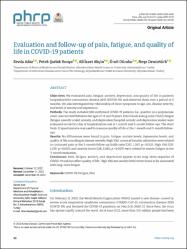| dc.contributor.author | Adar, Sevda | |
| dc.contributor.author | Şarlak Konya, Petek | |
| dc.contributor.author | Akçin, Ali İzzet | |
| dc.contributor.author | Dündar, Ümit | |
| dc.contributor.author | Demirtürk, Neşe | |
| dc.date.accessioned | 2023-04-17T08:10:47Z | |
| dc.date.available | 2023-04-17T08:10:47Z | |
| dc.date.issued | 2023 | en_US |
| dc.identifier.citation | Adar, S., Konya, P. Ş., Akçin, A. İ., Dündar, Ü., & Demirtürk, N. (2023). Evaluation and follow-up of pain, fatigue, and quality of life in COVID-19 patients. Osong Public Health and Research Perspectives, 14(1), 40-50. | en_US |
| dc.identifier.uri | https://dx.doi.org/10.24171/j.phrp.2022.0275. | |
| dc.identifier.uri | https://hdl.handle.net/20.500.12933/1462 | |
| dc.description.abstract | Objectives: We evaluated pain, fatigue, anxiety, depression, and quality of life in patients hospitalized for coronavirus disease 2019 (COVID-19) and observed them over a period of 3 months. We also investigated the relationship of these symptoms to age, sex, disease severity, and levels of anxiety and depression.
Methods: The study included 100 confirmed COVID-19 patients (i.e., positive on a polymerase chain reaction test) between the ages of 18 and 75 years. Pain (visual analog scale [VAS]), fatigue (fatigue severity scale), anxiety, and depression (hospital anxiety and depression scales) were evaluated on the first day of hospitalization and at 1-month and 3-month follow-ups. The short form-12 questionnaire was used to measure quality of life at the 1-month and 3-month followups.
Results: No differences were found in pain, fatigue, anxiety levels, depression levels, and quality of life according to disease severity. High VAS scores at hospital admission were related to continued pain at the 3-month follow-up (odds ratio [OR], 1.067; p<0.001). High VAS (OR, 1.072; p=0.003) and anxiety levels (OR, 1.360; p=0.007) were related to severe fatigue at the 3-month evaluation.
Conclusions: Pain, fatigue, anxiety, and depression appear to be long-term sequelae of COVID-19 and can affect quality of life. High VAS and anxiety levels were found to be associated with long-term fatigue. | en_US |
| dc.language.iso | eng | en_US |
| dc.publisher | Korea Centers for Disease Control & Prevention | en_US |
| dc.relation.isversionof | 10.24171/j.phrp.2022.0275. | en_US |
| dc.rights | info:eu-repo/semantics/openAccess | en_US |
| dc.subject | COVID-19 | en_US |
| dc.subject | Fatigue | en_US |
| dc.subject | Pain | en_US |
| dc.title | Evaluation and follow-up of pain, fatigue, and quality of life in COVID-19 patients | en_US |
| dc.type | article | en_US |
| dc.authorid | 0000-0003-4294-6761 | en_US |
| dc.department | AFSÜ, Atatürk Sağlık Hizmetleri Meslek Yüksekokulu, Fizyoterapi Bölümü | en_US |
| dc.contributor.institutionauthor | Adar, Sevda | |
| dc.contributor.institutionauthor | Şarlak Konya, Petek | |
| dc.contributor.institutionauthor | Akçin, Ali İzzet | |
| dc.contributor.institutionauthor | Dündar, Ümit | |
| dc.contributor.institutionauthor | Demirtürk, Neşe | |
| dc.identifier.volume | 14 | en_US |
| dc.identifier.startpage | 40 | en_US |
| dc.identifier.endpage | 50 | en_US |
| dc.relation.journal | Osong Public Health and Research Perspectives | en_US |
| dc.relation.publicationcategory | Makale - Uluslararası Hakemli Dergi - Kurum Öğretim Elemanı | en_US |
















